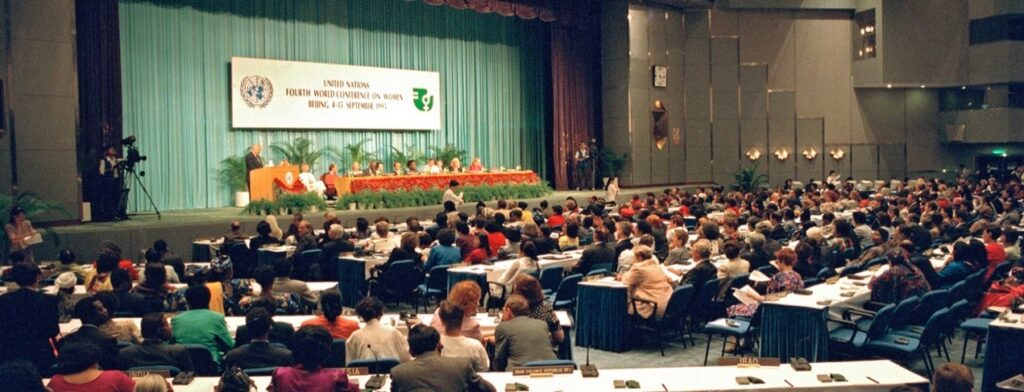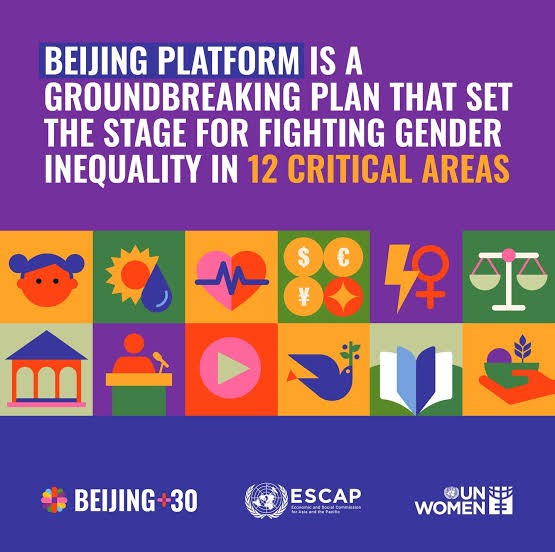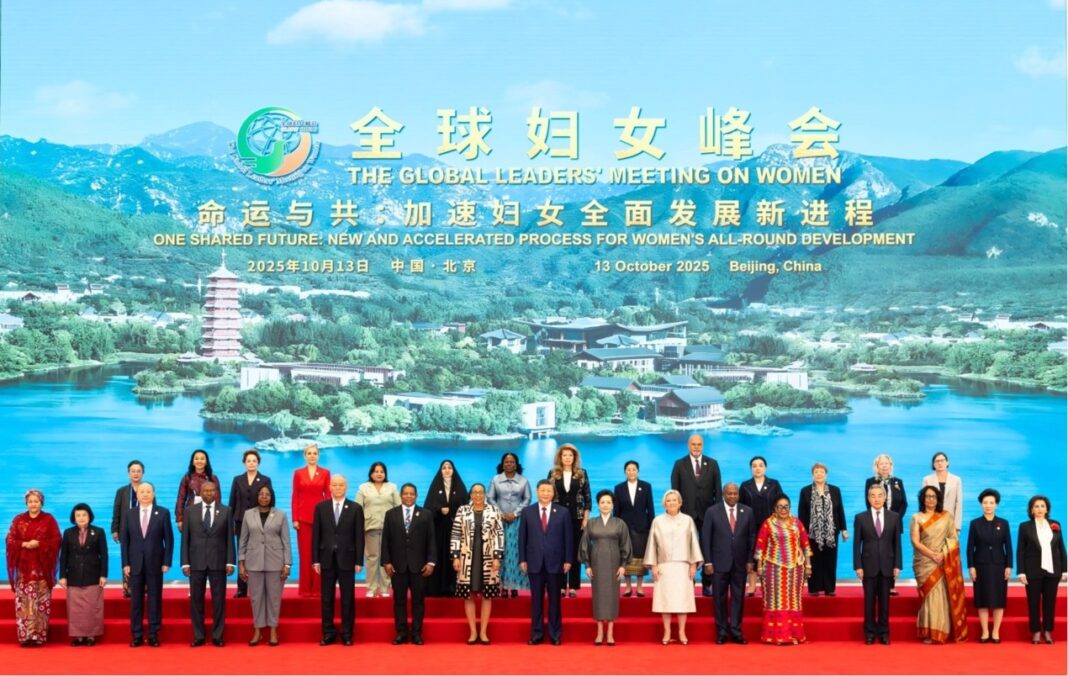As the world marks the 30th anniversary of the groundbreaking Beijing Declaration, China welcome global leaders to a new summit, showcasing three decades of progress and reigniting the global dialogue on gender equality.
On a crisp autumn morning in Beijing, the National Convention Center became a symbol of international solidarity as President Xi Jinping opened the Global Leaders’ Meeting on Women, marking 30 years since the landmark Fourth World Conference on Women in 1995. Flanked by his wife, Peng Liyuan, and greeted by a sea of national and UN flags, Xi welcomed leaders and delegates from around the world with handshakes and warm exchanges before delivering his keynote address.
In his speech, titled “Carrying Forward the Spirit of the Beijing World Conference on Women and Promoting the New and Accelerated Process for Women’s All-Round Development,” Xi reflected on the progress made since the adoption of the Beijing Declaration and Platform for Action three decades ago. The declaration, he said, enshrined the principles of “Action for Equality, Development and Peace,” shaping the global agenda for gender equality ever since. Xi praised the advances women have achieved in education, leadership, and participation across political, cultural, and economic spheres, calling it a “brilliant addition to the progress of human civilization.” Yet, he warned that challenges remain, particularly in ensuring equal opportunities and protecting women in vulnerable conditions. “Equality between men and women remains a lofty yet arduous task,” Xi said, urging the international community to renew its commitment and cooperation. He proposed four key areas for collective action:
First, he called for fostering an enabling environment for women’s growth, emphasizing the need for peace, protection from violence, and security for women in regions affected by conflict or disaster. Second, he urged nations to drive high-quality development for women by reducing global disparities and supporting women through innovation and access to the benefits of globalization. Third, Xi proposed stronger governance and legal frameworks to safeguard women’s rights, ensure equal access to health and education, and encourage women’s participation in political and social affairs. Lastly, he stressed the importance of deepening global cooperation, empowering women to take leadership roles in global governance, and promoting solidarity through the United Nations.
Xi also highlighted China’s achievements in promoting gender equality domestically, noting that women “hold up half the sky” in the country’s economic and social development. China, he said, will continue to support global women’s advancement by donating an additional US$10 million to UN Women, allocating US$100 million for women-focused projects through the Global Development and South-South Cooperation Fund, and launching 1,000 small-scale livelihood programs. Moreover, China will invite 50,000 women to participate in exchange and training programs and establish a Global Center for Women’s Capacity Building. In concluding his speech, Xi expressed China’s readiness to “carry forward the spirit of the Beijing World Conference on Women” and to work toward a community with a shared future for humanity.
Several global leaders echoed Xi’s message. Among the speakers were President Halla Tómasdóttir of Iceland, President Sylvanie Burton of Dominica, President John Dramani Mahama of Ghana, Prime Minister Maria Benvinda Delfina Levi of Mozambique, Prime Minister Harini Amarasuriya of Sri Lanka, UN Deputy Secretary-General Amina J. Mohammed, and UN Women Executive Director Sima Sami Bahous. They commended Xi’s proposals and China’s longstanding leadership in promoting women’s rights. The speakers underscored that the Beijing Declaration remains a foundational document for global gender equality and praised China’s achievements in poverty reduction, education, and women’s empowerment. As the morning session closed, Xi and Peng hosted a welcoming banquet for distinguished guests, attended by senior Chinese officials including Cai Qi, Wang Yi, Yin Li, Tie Ning, and Shen Yueyue. The day’s events not only celebrated the legacy of the 1995 Beijing Conference but also signaled a renewed global momentum—one that seeks to ensure women’s full participation and leadership in building a fairer, more sustainable world.
The global movement for gender equality is poised for a significant moment of reflection and renewal as Beijing host the Global Women’s Summit. This prestigious event commemorates a pivotal anniversary in the history of women’s rights: thirty years since the Fourth World Conference on Women and the unanimous adoption of the Beijing Declaration and Platform for Action. The original conference, held from September 4-15, 1995, was not just another international meeting; it was a landmark gathering that consolidated five decades of legal advances and set a new, ambitious course for securing equality for women both in law and in daily practice. It was the most consequential of the four world conferences on women held between 1975 and 1995, building upon the political agreements of its predecessors and drawing an unprecedented 17,000 participants, including 6,000 government delegates, alongside a parallel NGO Forum in Huairou that attracted a further 30,000 activists, creating a powerful fusion of official policy and grassroots energy.

The legacy of that 1995 conference is profound. It marked a significant turning point by shifting the global agenda from a focus solely on women to a deeper analysis of gender. The United Nations Division for the Advancement of Women itself noted that the fundamental transformation in Beijing was the recognition that the entire structure of society, and all relations between men and women within it, had to be re-evaluated. This was not about merely integrating women into existing systems, but about restructuring those systems to ensure women could stand as equal partners in all aspects of life. The Beijing Declaration and Platform for Action that emerged from this consensus, often called the key global policy document on gender equality, laid out a comprehensive roadmap across twelve critical areas of concern: women and poverty; education and training; health; violence; armed conflict; the economy; power and decision-making; institutional mechanisms; human rights; the media; the environment; and the girl-child.

In the three decades since, China has embarked on a sustained national project to embody the principles of the Beijing Declaration. Under the leadership of the Communist Party of China, the nation has constructed a robust legal and policy system designed to translate the promise of equality into tangible reality. The achievements are visible across the spectrum of society. Women in China today enjoy historically high levels of access to education, with near-universal literacy and significant representation in higher education. In the economic sphere, they have broken barriers in every field, contributing massively to the nation’s development, while in politics, their participation at various levels of government has seen a steady and intentional increase. A comprehensive health service network has dramatically improved maternal health outcomes and increased life expectancy for women, all underpinned by a growing social security and welfare system that protects their rights within marriage and the family.



